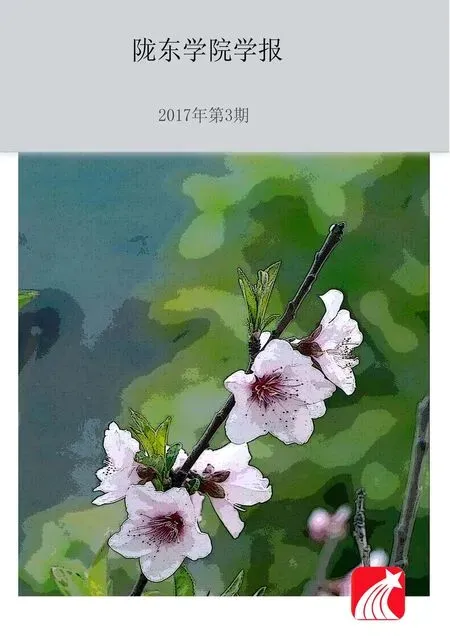β-氨基丁酸在高等植物抗逆反应中的作用
欧晓彬,陈培磊,燕晓娟
(1.陇东学院生命科学与技学院,甘肃庆阳745000;2.浙江大学生命科学学院,浙江杭州310058;3.陇东学院图书馆,甘肃庆阳745000)
β-氨基丁酸在高等植物抗逆反应中的作用
欧晓彬1,陈培磊2,燕晓娟3
(1.陇东学院生命科学与技学院,甘肃庆阳745000;2.浙江大学生命科学学院,浙江杭州310058;3.陇东学院图书馆,甘肃庆阳745000)
简述了β-氨基丁酸(BABA)在植物体内运输、代谢及其在植物应答生物和非生物逆境胁迫中作用的研究进展,指出BABA是否作为信号分子在植物体内起作用及其是否属于植物内源活性物质,这是当前迫切需要解决的重要问题。
β-氨基丁酸;高等植物;生物胁迫;非生物胁迫
β-氨基丁酸(BABA)又名DL-3-氨基丁酸,是一种非蛋白氨基酸,由四个碳原子和两个官能团(氨基和羧基)构成(图1A)。通过改变氨基的位置,BABA可衍生出两种同分异构体:α-氨基丁酸(α-aminobutyric acid,以下简称AABA)和γ-氨基丁酸(γ-aminobutyric acid,以下简称GABA)(图1B)。此外,BABA具有旋光性,包含有R-和S-两种对映异构体(图1C)[1]。
自上世纪60年代,BABA即已被证明具有诱导植物增强抗病性的能力[2-3]。但因BABA在植物体内含量低,直到1992年Gamliel等[4]才在番茄根部的浸出液中检测到其存在,随后也在王桉(Eucalyptusregnans)、银荆(Acaciadealbata)和黑木相思(Acaciamelanoxylon)等乔木的韧皮部及木质部的汁液中被检出[5]。近年来,Jakab[6]和Zimmerli等[7]先后发现BABA可以增强植物抗旱、耐热等抗非生物胁迫的能力。与之相比,AABA和GABA对植物的诱抗的作用却并不明显[8-12]。作为一种非常有应用前景的植物诱抗剂,BABA在植物抗逆中的作用已引起人们广泛的关注。

图1 β-氨基丁酸及其同分异构体的化学结构(参考Justyna and Ewa [1],略有改动)
1 β-氨基丁酸在植物体内的吸收、转运及代谢
植物的不同部位对BABA的吸收能力存在差异。根对BABA有部分透过性,吸收过程可能依赖于特定的转运子[13-14]。Cohen和Gisi[15]利用14C-BABA研究番茄对BABA的吸收,发现番茄根在2天内只能吸收施用总量的36%,而被密封于培养皿中的叶片以及被切断了的叶柄对BABA的吸收率在24h和72h后分别达到了73%和99%。此外,植物叶片对BABA的吸收能力与叶龄相关。葡萄的下、中、上三种不同部位的叶片对BABA的吸收率分别是5.02%、3.49%和29.9%,这表明新生叶片对BABA可能具有更强的吸收能力[12]。
BABA在整株植物的转运主要是通过木质部的运输作用来实现的[15]。BABA被叶片吸收后,既可向上运输,也可向下运输。葡萄叶片在吸收了14C-BABA之后,较远处的幼嫩叶片及根部均可检测到14C-BABA[12]。番茄叶片在被14C-BABA处理后,可以在新芽和根中检测到[15]。当BABA由根吸收后,主要集中在植物的幼嫩组织中[13,15],被注射到烟草茎部的14C-BABA最终也主要集中于新生叶中[13]。
在植物体中,BABA是一个很难被代谢的物质[1,13-14]。在烟草[14]和番茄[15]中,大部分外源施用的BABA可通过氨基酸提取法回收,仅有一小部分的BABA留存于细胞壁中。
2 BABA在植物抗生物胁迫中的作用
大量研究表明,作为一种广谱型植物免疫诱抗剂,BABA在多种寄主-病原互作系统能起到增强植物免疫力的效用[13-14]。寄主植物包括多种单子叶和双子叶植物[14];病原体包括:细菌、真菌、卵菌、病毒、线虫[14,16]和昆虫等[17-18]。此外,BABA的诱抗效用也较为持久。研究表明辣椒(Capsicumannuum)在喷施了BABA后的第15天,其对炭疽病的抗性作用仍旧十分明显[19],BABA对莴苣的诱抗作用能持续27天之久[20]。
有关BABA免疫诱抗作用机理已有大量研究,Estrella等[21-22]发现IBI1(Impaired in BABA-induced Immunity 1)基因所编码的蛋白,可能是植物感受BABA的受体,是本领域近年来最大的突破之一。目前,一般认为BABA免疫诱抗作用主要包括以下几个方面:(1)引植物发超敏反应(Hypersensitive Response,HR),叶面施用BABA的烟草[11]、番茄[23]、拟南芥[8]以及花椰菜[24]等,感染致病菌后均会引发局部细胞程序性死亡;(2)诱导细胞产生“氧爆”,Siegrist等[11]研究发现BABA能诱导烟草ROS的产生;(3)诱导植物抗病相关PR蛋白在植物体中表达[1];(4)促进植物抗毒素的合成[1];(5)促进胼胝质和木质素在细胞内累积,从而更为有效地抑制病原菌在植物体内的生长和繁殖[14]。(6)增强植物气孔免疫能力,抑制病原菌入侵[25]。
3 BABA在植物抗非生物胁迫中的作用
BABA不仅可以增强植物的抗病性,还可以提高植物抗非生物胁迫的能力。BABA提高植物的抗旱性现已在拟南芥[6]、海棠[26]、春小麦[27]、烟草[28]和马铃薯[29]等五种植物中获得证实:被BABA处理过的拟南芥在受到干旱胁迫时水分丧失仅约为对照植株的1/7;被诱导过的海棠累积了ABA信号通路相关的蛋白;处理组的春小麦也有ABA的累积。而在高盐胁迫中,诱导过的拟南芥萎蔫株数约为对照组的1/2[6];BABA对提高水稻的耐盐性也有作用,经过BABA处理的水稻萎蔫株数、脯氨酸含量与对照组相比较少,这些说明BABA处理后水稻受到高盐胁迫的伤害减少[30]。K+是植物所必需的三大营养元素之一,同时也是植物细胞的主要渗透调节物,在渗透调节方面发挥着重要的作用[31],缺钾会影响植物根系的生长以及叶绿素的含量[32]。研究发现BABA可以保护拟南芥和烟草免受低钾胁迫的伤害[32-33]。
尽管BABA在植物抗非生物胁中的作用已被证实,但是其作用机理现在仍不十分清楚,有待进一步研究。目前,已有的研究表明,植物激素ABA可能在这一过程中起作用。在拟南芥中,无论是干旱、高温还是高盐胁迫,BABA都是通过ABA信号通路提高植物的抗性[6-7]。春小麦根部浇灌BABA后,植株个体中ABA的含量明显升高,气孔导度降低,从而有效地提升了干旱胁迫下小麦的水分利用效率(WUE)[27]。然而,对苹果的蛋白表达分析显示:BABA处理过的植株仍会表达一些ABA不能诱导的蛋白,这说明BABA诱导植物对渗透胁迫的抗性并不完全依赖于ABA信号通路[26]。
4 研究展望

图2 β-氨基丁酸在高等植物抗生物和非生物胁迫中的作用机理
在过去的十年里,与BABA相关的研究在植物学领域已取得了许多重大进展(图2),尤其是已获得在植物中存在BABA受体类似物的分子及生理证据[21-22]。结合BABA在植物抗逆反应中的作用,使人们对植物体中BABA的作用产生了更浓厚的兴趣,但BABA在植物体中是否作为一种信号分子存在,仍有待进一步研究。此外,虽然在番茄等植物体中检测出BABA的存在,但截至目前,尚无证据表明这一非蛋白氨基酸是否属于植物内源活性物质。其原因可能是:(1)因为BABA在植株中含量低,难以检出;(2)BABA属于植物外源活性物质,由微生物产生。这一问题的解决可能将颠覆我们对植物响应环境胁迫范式的认知。
[1]Justyna PG and Ewa K. Induction of resistance against pathogens by β-aminobutyric acid[J].Acta Physiologiae Plantarum,2013,35(6):1735-1748.
[2]Papavizas FG. Survival of single-basidiospore isolates of rhizoctonia praticola rhizoctonia solani[J].Canadian Journal of Microbiolgy,1964,10(5):739.
[3]Oort AJ and Van AO. Aspects of chemotherapy[J]. Mededelingen van de Landbouwhogeschool te Gent,1960,25:991-992.
[4]Gamliel A and Katan J. Influence of seed and root exudates on fluorescent pseudomonads and fungi in solarized soil[J].Phytopathology,1992,82(3):320-327.
[5]Sahebani N and Hadavi N. Induction of H2O2and related enzymes in tomato roots infected with root knot nematode (M.javanica) by several chemical and microbial elicitors[J].Biocontrol Science and Technology,2009,19(3):301-313.
[6]Jakab G,Ton J,Flors V,et al. Enhancing Arabidopsis salt and drought stress tolerance by chemical priming for its abscisic acid responses[J].Plant Physiology,2005,139(1):267-274.
[7]Zimmerli L,Hou BH,Tsai CH,et al. The xenobiotic β-aminobutyric acid enhancesArabidopsisthermotolerance[J].The Plant Journal,2008,53(1):144-156.
[8]Zimmerli L,Jakab G,Metraux J P,et al. Protection of pathogen-specific defense mechanisms inArabidopsis by β-aminobutyric acid[J].Proceedings of the National Academy of Sciences,2000,97(23):12920-12925.
[9]Cohen Y. The BABA story of induced resistance[J].Phytoparasitica,2001,29(5):375-378.
[11]Siegrist J,Orober M,and Buchenauer H. β-aminobutyric acid-mediated enhancement of resistance in tobacco to tobacco mosaic virus depends on the accumulation of salicylic acid [J].Physiological and Molecular Plant Pathology,2000,56(3):95-106.
[12]Cohen Y,Reuveni M and Baider A. Local and systemic activity of BABA (DL-3-aminobutyric Acid) againstPlasmoparaviticolainGrapevines[J].European Journal of Plant Pathology,1999,105:351-361.
[13]Gabor Jakab,Valérie Cottier,Valérie Toquin,et al. β-aminobutyric acid-induced resistance in plants[J].European Journal of Plant Pathology,2001,107:29-37.
[14]Cohen Y. β-aminobutyric acid-induced resistance against plant pathogens [J].Plant Disease,2002,86(5):448-457.
[15]Cohen Y and Gisi U. Systemic translocation of14C-DL-3-aminobutyric acid in tomato plants in relation to induced resistance againstPhytophthorainfestans[J].Physiological and Molecular Plant Pathology,1994,45:441-456.
[16]Yuji Oka,Cohen Yigal,and Spiegel Y. Local and systemic induced resistance to the root-knot nematode in tomato by DL-β-aminobutyric acid[J].Phytopathology,1999,89(12):1138-1143.
[17]Hodge S,Thompson GA and Powell G. Application of DL-β-aminobutyric acid (BABA) as a root drench to legumes inhibits the growth and reproduction of the pea aphidAcyrthosiphonpisum(Hemiptera: Aphididae)[J].Bulletin of Entomological Research,2005,95(5):449-455.
[18]Wang XW,Cao HH,Zhang M,et al. Deciphering the mechanism of β-aminobutyric acid-induced resistance in wheat to the grain aphid,Sitobionavenae[J].PLoS ONE,2014,9(3):e91768.
[19]Hong JK,Hwang BK,and Kim CH. Induction of local and systemic resistance tocolletotrichumcoccodesin pepper plants by DL-β-aminobutyric acid[J].Journal of Phytopathology,1999,147:193-198.
[20]Cohen Y,Rubin AE and G Kilfin. Mechanisms of induced resistance in lettuce againstBremialactucaeby DL-β-aminobutyric acid (BABA)[J].European Journal of Plant Pathology,2009,126(4):553-573.
[21]Estrella L,Hulten M,Zhang Y,et al. Plant perception of β-aminobutyric acid is mediated by an aspartyl-tRNA synthetase[J].Nature Chemical Biology,2014,10:450-459.
[22]Schwarzenbacher RE,Luna E and Ton J. The discovery of the BABA receptor: scientific implications and application potential[J].Frontiers in Plant Science,2014,5:1-3.
[23]Cohen Y. Local and systemic control ofphytophthorainfestansin tomato plants by DL-3 -aminobutyric acids[J].Phytopathology,1993,84:55-59.
[24]Silué D,Pajot E,and Cohen Y. Induction of resistance to downy mildew (Peronosporaparasitica) in cauliflower by DL-β-aminobutyric acid (BABA)[J].Plant pathology,2002,51:97-102.
[25]Tsai CH,Singh P,Chen CW,et al. Priming for enhanced defence responses by specific inhibition of theArabidopsisresponse to coronatine[J].The Plant Journal,2011,65(3):469-479.
[26]Macarisin D,Wisniewski M E,Bassett C,et al. Proteomic analysis of β-aminobutyric acid priming and abscisic acid - induction of drought resistance in crabapple (Maluspumila): effect on general metabolism,the phenylpropanoid pathway and cell wall enzymes[J].Plant Cell & Environment,2009,32(11):1612-1631.
[27]Du YL,Wang ZY,Fan JW,et al. β-Aminobutyric acid increases abscisic acid accumulation and desiccation tolerance and decreases water use but fails to improve grain yield in two spring wheat cultivars under soil drying[J].Journal of Experimental Botany,2012,63(13):4849-4860.
[28]刘松.BABA诱导烟草幼苗抵御干旱胁迫和镉胁迫的初步研究[D].安徽合肥:中国科技大学,2016:31-45.
[29]Sós-Hegedus A,Juhász Z,Poór P,Kondrák M,et al. Soil drench treatment with β-anminobutyric acid increases drought tolerance of potato [J].PLoS ONE,2014,9(12):e114297.
[30]He Y,Xie J and Li Chunxiao. Preliminary study on the enhancement of salt tolerance of rice seedlings by β-aminobutyric acid[J].Journal of Anhui Agricultural Sciences,2010,38(2):641-642.
[31]Maathuis,FJM and Sanders D. Mechanisms of potassium absorption by higher plant roots[J].Physiologia Plantarum,1996,96(1):158-168.
[32]Jiang,L,Yang RZ,Lu YF,et al. β-aminobutyric acid-mediated tobacco tolerance to potassium deficiency[J].Russian Journal of Plant Physiology,2012,59(6):781-787.
[33]Cao S,Jiang L,Yuan H,et al. β-aminobutyric acid protectsArabidopsisagainst low potassium stress[J].Acta Physiologiae Plantarum,2007,30(3):309-314.
【责任编辑 赵建萍】
Functions of β-aminobutyric Acid in the Adverse Reaction of Higher Plants
OU Xiao-bin1,CHEN Pei-lei2,YAN Xiao-juan3
(1.CollegeofLifeScienceandTechnology,LongdongUniversity,Qingyang745000,Gansu; 2.CollegeofLifeScience,ZhejiangUniversity,Hangzhou310058,Zhejiang; 3.LongdongUniversityLibrary,LongdongUniversity,Qingyang745000,Gansu)
The research progress in transportation and metabolism of β-aminobutyric acid (BABA) in plants and their roles in plant responses to both biotic and abiotic stresses were briefly reviewed here. It has been pointed out that whether BABA acts as a signal molecule in plants or it is a natural endogenous constituent of plant are two urgent problems to be solved.
β-aminobutyric acid;higher plant;biotic stress;abiotic stress
1674-1730(2017)03-0056-04
2017-01-06
国家自然基金《β-氨基丁酸诱导气孔关闭机制及其节水效应研究》(31560125)
欧晓彬(1982—),男,江苏宿迁人,副教授,博士,主要从事植物分子生物学研究。
Q945.78
A

